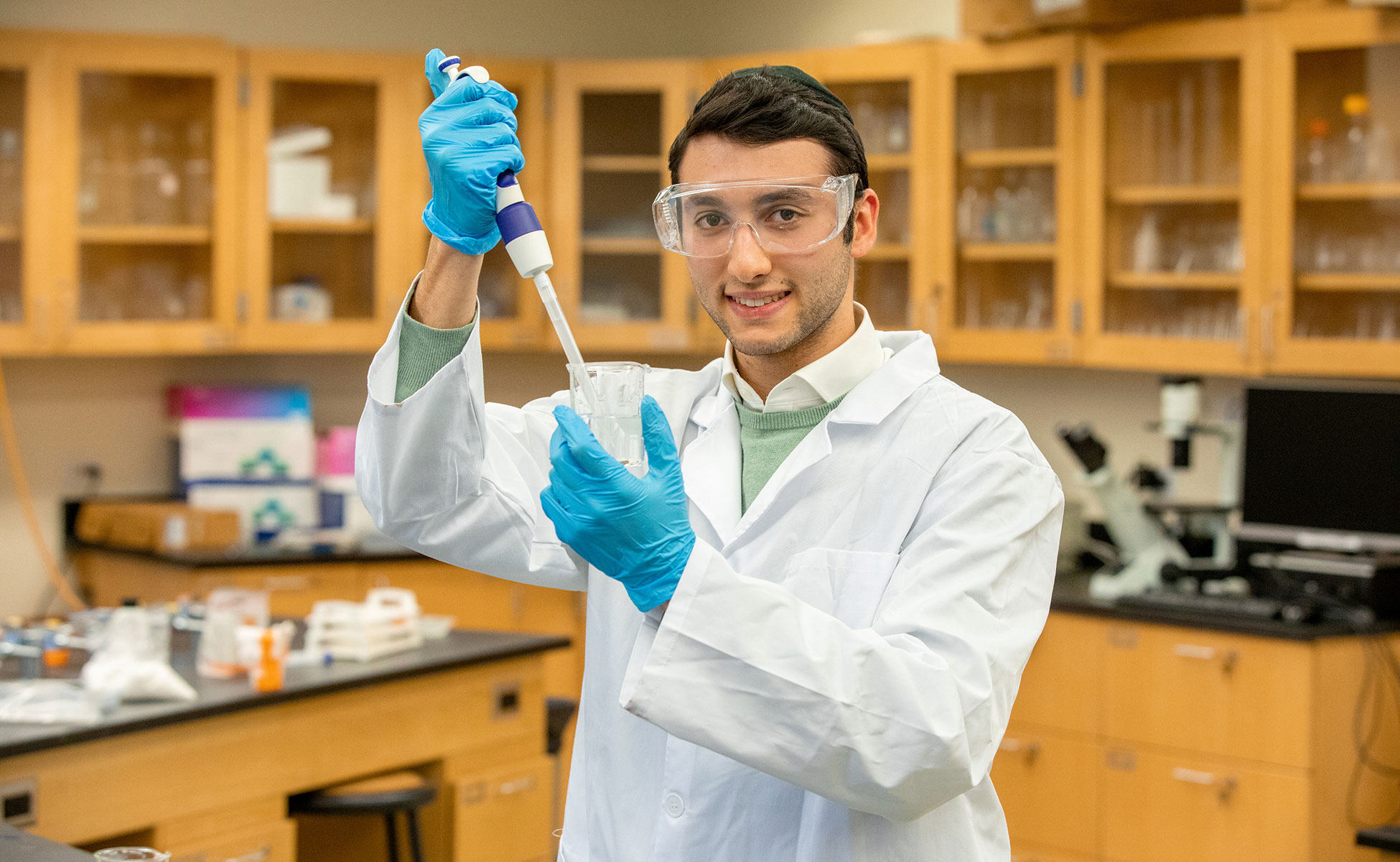Required Courses (32 Credits)
CPCN 101 - Inorganic Chemistry I (4 credits)
Introduction to the double-entry system of debits and credits, journal entries and general ledger accounts, steps leading up to financial statement preparation and format of financial statements. Also included are studies of merchandising companies and determination of inventory balances and cost of goods sold, and an introduction to the accounting treatment of various assets and liabilities. US accounting standards (GAAP) are contrasted with international standards (IFRS).
CPCN 102 - Inorganic Chemistry II (4 credits)
Topics covered include nomenclature, stoichio-metric relationships, atomic structure, bonding and states of matter. In addition, topics treated include chemical equilibria, free energy and entropy, acid-base reactions, oxidation reduction and electro-chemistry, complexions, reaction rates, radioactivity, and elementary concepts of organic chemistry. Laboratory work entails experiments illustrating the principles taught in lecture and qualitative analysis. Prerequisite for CPCN 102: MATN 120.
CPCN 201 - Organic Chemistry I (4 credits)
Subjects covered include reactions, synthetic procedures, and methods for differentiation and identification. Mechanisms of reactions, stereochemistry and spectroscopy are emphasized. Details of the characteristics of aliphatic, and aromatic compounds with different functional groups are stressed. Laboratory work includes the methodology of 126 synthetic and analytic procedures. (Lecture and laboratory course.) Prerequisites: CPCN 101-102.
CPCN 202 - Organic Chemistry II (4 credits)
Subjects covered include reactions, synthetic procedures, and methods for differentiation and identification. Mechanisms of reactions, stereochemistry and spectroscopy are emphasized. Details of the characteristics of aliphatic, and aromatic compounds with different functional groups are stressed. Laboratory work includes the methodology of 126 synthetic and analytic procedures. (Lecture and laboratory course.) Prerequisites: CPCN 101-102.
CPCN 222 - Analytical Chemistry (4 credits)
Topics covered in this course include the quantitative analysis of inorganic compounds by volumetric, gravimetric, and calorimetric procedures. Emphasis is on the precision of instruments, estimation of error, attainment of accuracy, and development of sound laboratory techniques. (Lecture and laboratory course.) Prerequisites: CPCN 101-102.
CPCN 301 - Advanced Organic Chemistry (3 credits)
A continuation and amplification of the topics considered in 201-202. Among the subjects discussed are the uses of spectroscopy in structure determination, organic reaction mechanisms, and synthetic methods. Prerequisites: CPCN 201-202.
CPCN 421 - Physical Chemistry I (3 credits)
A complete introduction to physical chemistry: the properties of gases, thermodynamics, chemical kinetics, electrochemistry, theory of solutions, quantum theory, and wave mechanics. Corequisite: MATN 201.
CPCN 422 - Physical Chemistry II (3 credits)
A complete introduction to physical chemistry: the properties of gases, thermodynamics, chemical kinetics, electrochemistry, theory of solutions, quantum theory, and wave mechanics. Corequisite: MATN 201.
CPCN 493 - Research Project in Chemistry (3 credits)
Prerequisite: Senior status or departmental permission.
Related Required Courses (19 Credits)
CPPN 101 - General Physics I (4 credits)
This course, designed for the non-Physics major, covers classical mechanics, heat, electricity, magnetism, and light, and sound phenomena. The approach is generally quantitative, but does not require calculus. Laboratory experiments illustrate and test the fundamental laws and the reliability of results. (Lecture and laboratory course.) Prerequisite: MATN 120.
CPPN 102 - General Physics II (4 credits)
This course, designed for the non-Physics major, covers classical mechanics, heat, electricity, magnetism, and light, and sound phenomena. The approach is generally quantitative, but does not require calculus. Laboratory experiments illustrate and test the fundamental laws and the reliability of results. (Lecture and laboratory course.) Prerequisite: MATN 120.
MATN 121 - Calculus I (4 credits)
Continuity, limits, differentiation, and integration of polynomial, exponential, and trigonometric functions. Curve sketching and related rates. Definite integrals, arc length, parametric equations and conic sections. Applications to geometry, physics, and other areas. Prerequisite: MATN 120 or placement by departmental examination.
MATN 122 - Calculus II (4 credits)
Continuity, limits, differentiation, and integration of polynomial, exponential, and trigonometric functions. Curve sketching and related rates. Definite integrals, arc length, parametric equations and conic sections. Applications to geometry, physics, and other areas. Prerequisite: MATN 120 or placement by departmental examination.
MATN 201 - Advanced Calculus (3 credits)
Continuation of MATN 121-122. Functions of several variables and partial differentiation; directional derivative, gradient and Lagrange Multipliers; vector algebra and analysis; multiple integrals and Jacobians; infinite sequences and series; Taylor series; complex numbers, Euler’s formula and deMoivre’s formula; introduction to elementary theory of ordinary differential equations; separation of variables; linear equations with constant coefficients; and series solutions. Prerequisite: MATN 122.
One Elective from the following (3 credits)
CPCN 311 - Biochemistry I (3 credits)
Emphasis on the chemical descriptions of the basic biological systems such as proteins, lipids, carbohydrates, and nucleic acids. Aspects dealt with are structure, metabolism, functions in the cell, and control mechanisms.
CPCN 311 - Biochemistry II (3 credits)
Emphasis on the chemical descriptions of the basic biological systems such as proteins, lipids, carbohydrates, and nucleic acids. Aspects dealt with are structure, metabolism, functions in the cell, and control mechanisms.
Total Credits in Program: 54


